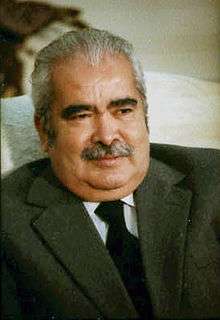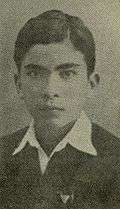Luis Herrera Campins
| Luis Herrera Campins | |
|---|---|
 | |
| President of the Republic of Venezuela | |
|
In office 12 March 1979 – 2 February 1984 | |
| Preceded by | Carlos Andrés Pérez |
| Succeeded by | Jaime Lusinchi |
| Senator for life | |
|
In office 2 February 1984 – 30 December 1999 | |
| Personal details | |
| Born |
Luis Antonio Herrera Campins 4 May 1925 Acarigua, Portuguesa, Venezuela |
| Died |
9 November 2007 (aged 82) Caracas, Venezuela |
| Political party | Copei |
| Spouse(s) | Betty Urdaneta |
| Religion | Roman Catholic |
| Signature |
 |
Luis Antonio Herrera Campins (4 May 1925 – 9 November 2007) was President of Venezuela from 1979 to 1984. He was elected to one five-year term in 1978. He was a member of the COPEI, a Christian Democrat party.
Early life and career

Luis Antonio Herrera Campins was born in Acarigua, Portuguesa. He studied law initially at Central University of Venezuela, though his studies were interrupted when he was imprisoned during the regime of Marcos Pérez Jiménez. He eventually earned his law degree in 1955 from the Universidad de Santiago de Compostela.
Herrera entered politics in 1937, and from 1959 to 1979 he served in the National Congress. He became President of Venezuela on 12 March 1979.
Presidency
| Venezuelan Presidential election 1978 | |||||||||||||||
| Results | |||||||||||||||
| |||||||||||||||
Herrera won the December 1978 presidential elections for COPEI, replacing the social democrat Carlos Andrés Pérez of the Democratic Action (AD) party, who had nationalised the oil industry at the height of the boom in 1975. Oil revenues continued to rise during the early years of Herrera's presidency. Herrera had a dirigiste view of the Government's economic role, which involved channelling public funds into agricultural and industrial projects, paying generous subsidies and controlling the prices of many goods. His Government continued President Pérez's policy of borrowing on a world market awash with petrodollars, and by the early 1980s Venezuela owed the banks more than $20 billion. The Government's tacit assumption was that oil prices would remain high forever, and would sustain high levels of public and private consumption.
As president, Herrera implemented cultural development programs and education reforms. He liberalised prices, resulting in rapid changes in the value of the Venezuelan bolívar.
Moved in part by territorial claims, Herrera developed a muscular foreign policy. He signed an agreement with Mexico in 1980 to jointly provide Central American and Caribbean countries with a steady flow of oil, a precursor of Hugo Chávez’s wide-reaching oil diplomacy in the developing world. In 1982 Herrera sided with Argentina in its war with the United kingdom over the Falkland Islands or Islas Malvinas, adroitly exploiting anti-British and anti-American sentiment to boost his flagging popularity. His support for Argentina came while he was asserting Venezuela’s longstanding claim to more than half of neighboring Guyana, a former British colony. His government also recognized the Sahrawi Arab Democratic Republic as the sovereign state in Western Sahara.
Herrera's cabinet (1979-1984)
|
||||||||||||||||||||||||||||||||||||||||||||||||||||||||||||||||||||||||||||||||||||||||||||||||||||||||||||||||||||||||||||||||||||||||
Later life
By the time Herrera's term ended, the economy was in meltdown, poverty and hardship were widespread and the voters turned on the ruling Christian Democrat, ejecting the party from office in the elections of December 1983. After the end of his presidency, Herrera remained influential in the Copei party, becoming its president in 1995.
In 2001, Herrera made headlines when gunmen stole his car. Afterward, he could be seen on foot wearing old clothes and carrying his own groceries. He underwent a series of surgeries for an abdominal aneurysm that led to a kidney infection and other complications. Herrera died on 9 November 2007 in Caracas at the age of 82, at a juncture by which he had already retired from Venezuelan politics. He was survived by his wife Betty Urdaneta and three sons.
See also
References
| Wikimedia Commons has media related to Luis Herrera Campíns. |
- ↑ Gaceta Oficial de Venezuela, period 1979-1984.
- (Spanish) Luis Herrera Campins — Official biography (but rather biased, based on historical view of current Venezuelan administration)
- (Spanish) Luis Herrera Campins
- Obituary in The Times, 14 November 2007
- Obituary from the International Herald Tribune
- Herrera's inauguration day on YouTube
| Political offices | ||
|---|---|---|
| Preceded by Carlos Andrés Pérez |
President of Venezuela 1979–1984 |
Succeeded by Jaime Lusinchi |
| Party political offices | ||
| Preceded by Leonardo Fernández (1973) |
COPEI presidential candidate 1978 (won) |
Succeeded by Rafael Caldera |
